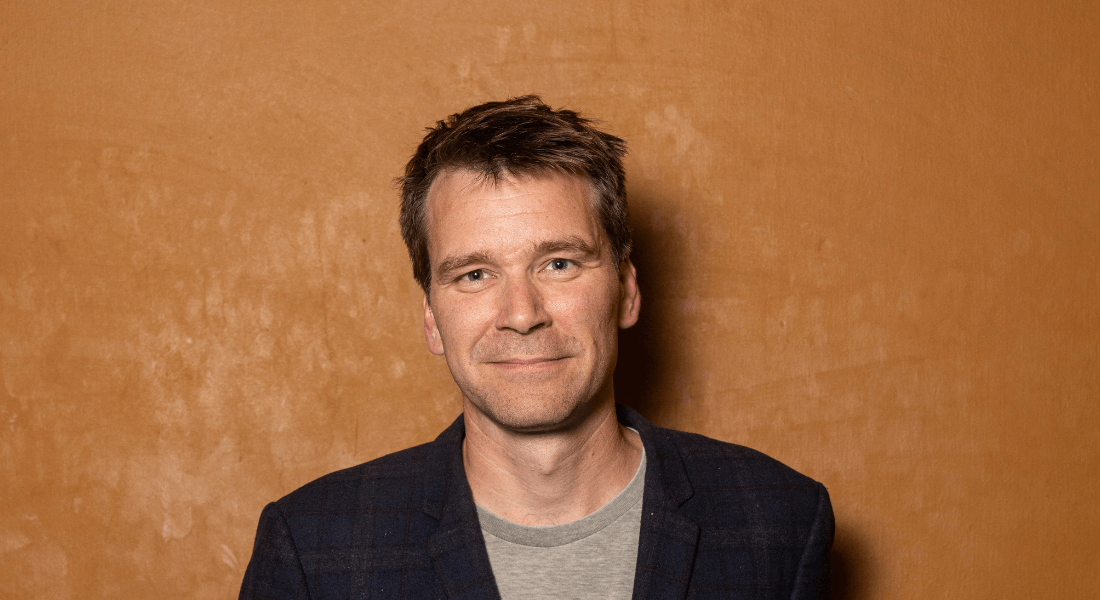Johan received the Innovation Award 2024: "It's about finding the right people to work with"
Johan Andersen-Ranberg from Plant Biochemistry was honored at the University of Copenhagen's Annual Commemoration for his work on contraceptive-based rat control. Here, he shares his journey from research to business.

Johan Andersen-Ranberg is a happy man. When he was recently surprised with the news that he was the recipient of the 2024 Innovation Award at the University of Copenhagen, he became even happier. He received the award at the university’s Annual Commemoration in November for his outstanding research, which has now transformed into the company TriptoBIO—a startup producing ingredients for plant-based rat contraception.
"It's super cool to receive such an award. It's a feather in my cap, but the best part of winning the Innovation Award is that it creates new opportunities to secure resources for more innovation projects here at the University of Copenhagen," says Johan Andersen-Ranberg about the delightful surprise.
It all started when Johan Andersen-Ranberg discovered a new method to produce the substance triptolide, which is used to control rats by inhibiting their fertility. Unlike traditional rat control with poison, fertility-based rat control is both more humane and sustainable, as the rats are allowed to live, while ecosystems are spared from being damaged by rat poison that leaks into nature.
The dream scenario would, of course, be to completely stop using rat poison, and for this fertility-based solution to be adopted everywhere in the world.
Triptolide is typically only found in a rare Chinese plant, making it expensive and difficult to obtain. However, Johan Andersen-Ranberg has developed a method to produce the substance in yeast cells in a laboratory. This allows for large-scale production at a lower cost. This breakthrough led to the creation of TriptoBIO, a company he has high hopes for.
"The dream scenario would, of course, be to completely stop using rat poison, and for this fertility-based solution to be adopted everywhere in the world. This would spare us from secondary poisonings caused by current substances—not only poisoning birds but also children who might accidentally ingest them," Johan Andersen-Ranberg explains.
The right people at the right time
Having a great research idea is one thing. Transforming it into a successful business idea is another. Establishing an actual company is yet another challenge. The path from researcher to entrepreneur is not always straightforward, so where does one begin?
According to Johan Andersen-Ranberg, the first thing to remember is that there are similarities between research and business. Both involve coming up with an idea, presenting it convincingly, and hoping someone will provide funding to realize it.
"In the research world, it's about convincing research funds. In the startup world, it's about convincing foundations, venture capitalists, and investors. In that sense, it's very similar," he explains.
As a researcher, who likes to look at data before making statements, it's a bit strange to provide estimates on what the market will look like in 3-4 years when you essentially have no clue.
Despite these similarities, there is a significant difference between the two worlds, which has been one of Johan Andersen-Ranberg's biggest challenges.
"The languages of the two fields are different. For investors, you need to talk about exit value, ROIs, market projections, and so on. As a researcher, who likes to look at data before making statements, it's a bit strange to provide estimates on what the market will look like in 3-4 years when you essentially have no clue. But that's how it works in the business world, and it's a whole new language to deal with," he elaborates. Johan Andersen-Ranberg credits his business partner as the key to bridging the gap between research and business.
"It's about finding the right people at the right times. I was fortunate to find Jon Christensen, a former business consultant, early in the process. It's like finding a translator—someone who can translate what you say into business language," he says.
Up and down like rock’n’roll
With ten employees, two different "languages," and a dream of entering the global market, it’s clear that Johan Andersen-Ranberg is moving fast. Alongside running the business, he continues his research at the university. So, how does he balance it all?
"Well, it goes up and down like rock ’n’ roll, as they say!" Johan Andersen-Ranberg laughs and adds:
"Of course, there are only so many hours in a day, but it’s about finding the right people to work with. You support each other’s roles, and I’ve been lucky to find the best people. So, when my time is limited, there’s always someone to take over—whether it’s postdocs and PhDs at the university or highly skilled employees in the company."
When asked if he has any advice for other researchers considering an entrepreneurial journey, his message is clear.
"I think you need to decide what excites you. Many at the university enjoy working independently, and that’s exactly the mindset needed to start your own company. You can’t wait for someone to tell you what to do," he says, adding:
"That said, you should definitely talk to people outside the university. It can be as simple as talking to family and friends, because if you can’t explain your idea to them, it will be very hard to convince an investor or business partner that what you’re working on is a good idea. So, practice on them as long as they’re willing to listen," he concludes.
Johan Andersen-Ranberg holds nine patents in collaboration with others, and TriptoBIO marks his first venture as a business owner.
Contact
Johan Andersen-Ranberg
Associate Professor in Plant Biochemisty and co-founder, TriptoBIO
Department of Plant and Environmental Sciences
Faculty of SCIENCE
joar@science.ku.dk
+45 35 33 77 88
Nikolaj Falkenberg-Klok
Communications Officer
Faculty of Science
University of Copenhagen
nfk@science.ku.dk
+45 51 70 01 54
